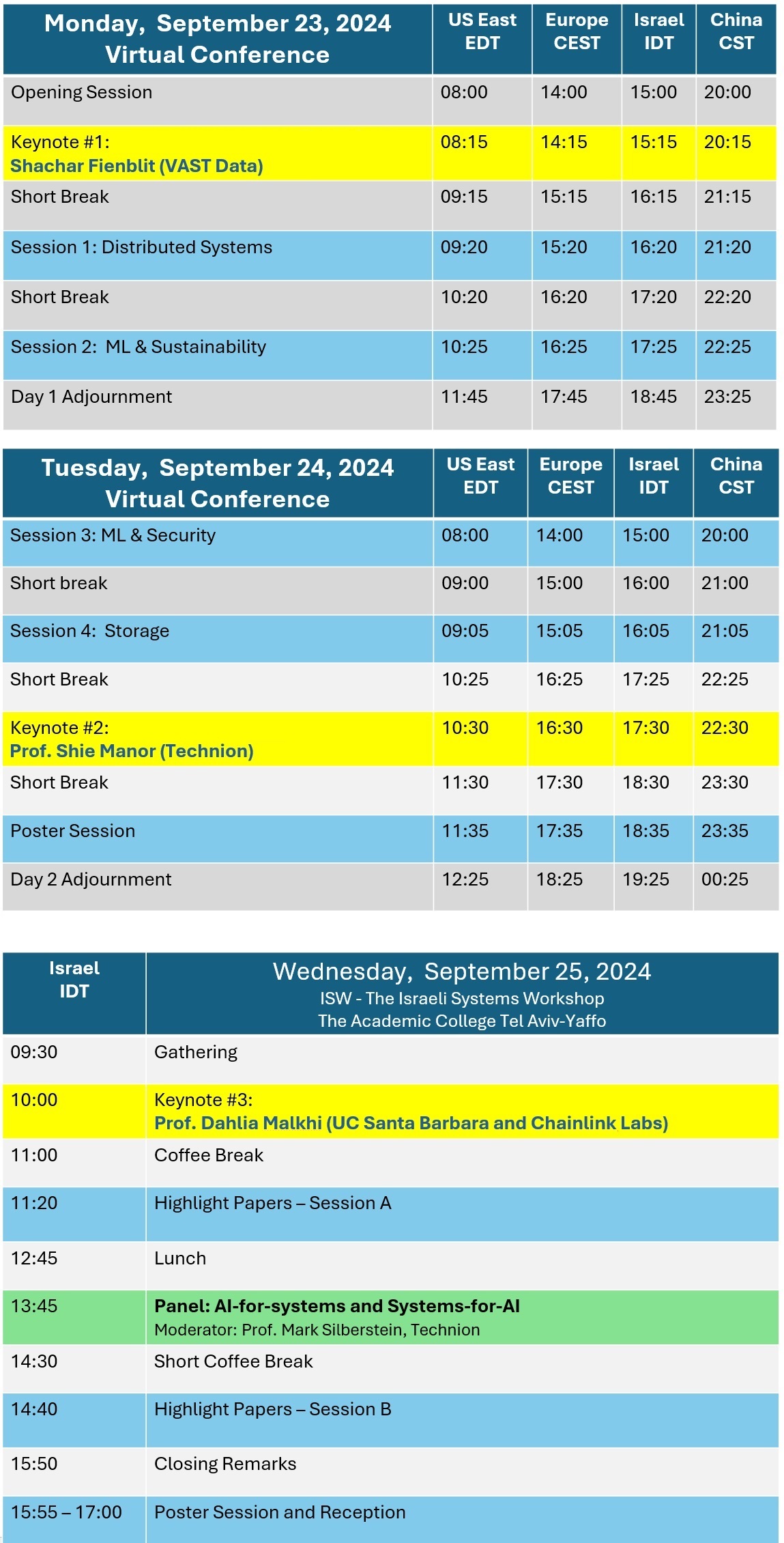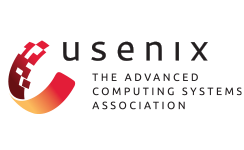For questions join the ACM Systor Conference Slack workspace,
then use the relevant session’s channel (links under each session below).
Keynotes

AI is evolving beyond traditional text-based analysis, now encompassing multi-modal data such as images, video, and audio. This evolution exponentially increases the scale and scope of data available for analysis and requires a new Data Platform for exabyte-scale data. Scalability, Complexity and cost have historically been significant barriers to the widespread adoption of data and AI technologies. However, the emergence of new, more scalable and resilient architectures is rapidly dismantling these obstacles, unlocking a multitude of opportunities for simplification and innovation.
In this talk I will focus on the algorithms and data structures we’ve implemented in the VAST Data Platform, a unified global datastore, database, and AI computing engine. I will explore practical algorithms and data structures that break traditional trade-offs between speed, cost, and resiliency. Key topics will include similarity compression, error correction codes, and scalable data structures designed to optimize high performance and scalable file system, database queries and AI pipelines.
Shachar Fienblit is the co-founder and Chief R&D Officer of VAST Data, a successful startup in the area of storage platform.
Shachar has an extensive experience in the storage industry. He served as the CTO and VP Engineering of Kaminario, working on on-premises all-flash array, and with the storage on-premises products of IBM.

There are many problems in hardware that can be succinctly described with the reinforcement learning (RL) framework. In such problems an agent needs to make a decision has potentially long-term consequences. While in general RL algorithm are too complex to implement in real-time hardware, we describe the tradeoffs needed to facilitate effective and efficient implementation of RL algorithms in hardware. I will focus on practical algorithms we have implemented at Nvidia for network congestion control, cache prefetching aggressiveness, and online configuration selection. I will then describe the challenges in building practical real world RL-based systems such as lack of stationarity, stability and safety requirements, etc.
Shie Mannor is the incumbent Edwards Chair in Engineering at the Electrical and Computer Engineering at the Technion. Shie has published over 80 journal papers and over 250 conference papers and his papers were cited over 31K times. Shie’s research interests include machine learning and data science with an emphasis on reinforcement learning, planning and control, and analysis and control of large-scale systems. Shie has co-founded four companies and is currently a distinguished scientist at Nvidia.

This talk gives a glimpse onto a decade of innovation which has been sparked by blockchains in scaling BFT Consensus.
In a nutshell, a Consensus system allows a network of nodes to act in coordinated manner despite both benign outages and security (“Byzantine”) threats. For over four decades, experts in the field have been looking for Consensus solutions that can perform well in practice.
In 2018, HotStuff transformed the landscape of practical BFT consensus solutions by introducing two key contributions, linearity and streamlining: HotStuff is the first BFT protocol that achieves linear communication complexity even when a fault occurs. Additionally, the HotStuff protocol is modular, consisting of a recurring broadcast module that can be pipelined, such that each broadcast extends the sequence of decisions by one.
HotStuff was adopted by the famous Diem(Libra) project to drive global payment rails backed by a consortium-operated blockchain. In the end, Diem did not launch, but the technology behind it illuminated and fertilized the field.
The talk overviews solutions enabled by HotStuff to open problems which emerged under a variety of settings, underscoring insights from the blockchain arena that led to new approaches.
Dahlia Malkhi is a Professor in the Department of Computer Science of UCSB since 2024. She heads the Foundations of Financial Technology lab. Her research over two decades spans broad aspects of reliability and security of distributed systems, recently with focus on blockchains and advances in financial technology. Her work resulted in over 200 publications as well as a strong impact on computing technology.
Malkhi serves as Distinguished Scientist of Chainlink Labs since 2022. From 2019 to 2022, she was the CTO at the Diem Association, and Lead Researcher at Novi Financial. In 2014, she co-founded VMware Research and became a Principal Researcher at VMware until 2019. Prior to that, Malkhi was a partner principal researcher at Microsoft Research, 2004-2014; an Associate Professor of the Hebrew University of Jerusalem, and a senior researcher at AT&T Labs.
For questions join the ACM Systor Conference Slack workspace,
then use the relevant session’s channel (links under each session below).
Sessions:
Session 1: Distributed Systems
Chair: Ningfang Mi (Northeastern), Slack channel
- IndiLog: Bridging Scalability and Performance in Stateful Serverless Computing with Shared Logs
Maximilian Wiesholler TU Munich/Huawei Munich Research Center; Florin Dinu, Javier Picorel Huawei Munich Research Center; Pramod Bhatotia TU Munich - Performance Characterization of SmartNIC NVMe-over-Fabrics Target Offloading
Jiexiong Xu Zhejiang University and Alibaba Group; Yue Qiu Nanyang Technological University; Yiquan Chen Zhejiang University and Alibaba Group; Yijing Wang Alibaba Group; Wenhai Lin and Yiquan Lin Zhejiang University and Alibaba Group; Shushu Zhao Alibaba Group; Yuqi Liu, Ying Wang Zhejiang University and Alibaba Group; Wenzhi Chen Zhejiang University - TPGraph: A Highly-scalable Time-partitioned Graph Model for Tracing Blockchain
Xiangao Chen, Kecheng Huang, Tianyu Wang and Zili Shao The Chinese University of Hong Ko
Session 2: ML & Sustainability
Chair: Bryan Kim (Syracuse), Slack channel
- Offloading Datacenter Jobs to RISC-V Hardware for Improved Performance and Power Efficiency
Balvansh Heerekar Virginia Tech; Cesar Philippidis Rasec Tech; Ho-Ren Chuang Virginia Tech; Pierre Olivier The University of Manchester; Antonio Barbalace The University of Edinburgh; Binoy Ravindran Virginia Tech - Foreseer: Knowledge-Driven Acceleration of Memory-Bound Matrix Multiplications for Large Language Model Inference
Cong Li and Yutao Xu Intel Corporation - Optimizing GPU Sharing for Container-Based DNN Serving with Multi-Instance GPUs
Xinpeng Wei Georgia Institute of Technology; Zhichao Li ByteDance Inc.; Cheng Tan Northeastern University - Can OS Specialization give new life to old carbon in the cloud?
Han Dong Boston University; Sanjay Arora Red Hat Inc; Orran Krieger and Jonathan Appavoo Boston University
Session 3: ML&Security
Chair: Mai Zheng (Iowa State University), Slack channel
- TwinPilots: A New Computing Paradigm for GPU-CPU Parallel LLM Inference (Best paper)
Chengye Yu The Chinese University of Hong Kong; Tianyu Wang Shenzhen University; Zili Shao The Chinese University of Hong Kong; Linjie Zhu and Xu Zhou Sangfor Technologies Inc; Song Jiang University of Texas at Arlington - RecTS: A Temporal-Aware Memory System Optimization for Training Deep Learning Recommendation Models
Cheng-Yu Chen, Jui-Nan Yen, Chia-Lin Yang, You-Ru Lai and Yun-Ping Lin National Taiwan University - WannaLaugh: A Configurable Ransomware Emulator – Learning to Mimic Malicious Storage Traces
Dionysios Diamantopoulos IBM Research Europe; Roman Pletka IBM Research – Zurich; Slavisa Sarafijanovic IBM Research; Narasimha Reddy Texas A&M University; H. Pozidis IBM Research GmbH, Switzerland
Session 4: Storage
Chair: Amit Golander (Tel Aviv University), Slack channel
- An Adaptive Zone-Grouping Scheme Enabling General-Purpose File Systems on ZNS SSDs
Jungyun Choi Samsung Electronics; Jongseok Kim, Jaehyung Park, Yuhun Jun and Euiseong Seo Sungkyunkwan University - Space-efficient FTL for Mobile Storage via Tiny Neural Nets
Ron Marcus, Alon Rashelbach, Pavel Lifshits, Ori Ben Zur and Mark Silberstein Technion – Israel Institute of Technology - Exploring I/O Management Performance in ZNS with ConfZNS++
Krijn Doekemeijer Vrije Universiteit Amsterdam; Dennis Maisenbacher Western Digital Corporation; Zebin Ren Vrije Universiteit Amsterdam; Nick Tehrany BlueOne Business Software LLC; Matias Bjørling Western Digital; Animesh Trivedi Vrije Universiteit Amsterdam - CMOSS: A Reliable, Motif-based Columnar Molecular Storage System
Eugenio Marinelli, Yiqing Yan and Lorenzo Tattini EURECOM, Sophia Antipolis; Virginie Magnone and Pascal Barbry IPMC – Institut de Pharmacologie Moléculaire et Cellulaire; Raja Appuswamy EURECOM, Sophia Antipolis
Posters Session:
Israeli Systems Workshop (ISW 2024): Highlight Papers
- Physical vs. Logical Indexing with IDEA: Inverted Deduplication-Aware Index, FAST’24
Asaf Levi (Technion); Philip Shilane (Dell Technologies); Sarai Sheinvald (Braude College of Engineering); Gala Yadgar (Technion) - Deconstructing Alibaba Cloud’s Preemptible Instance Pricing, HPDC’23
Danielle Movsowitz Davidow (University of Haifa, Tel Aviv University); Orna Agmon Ben-Yehuda (CRI, University of Haifa); Orr Dunkelman (University of Haifa, TU Berlin) - In-Network Address Caching for Virtual Networks, SIGCOMM’24
Lior Zeno (Technion); Ang Chen (University of Michigan); Mark Silberstein (Technion) - A Practical Near Optimal Deployment of Service Function Chains in Edge-to-Cloud Networks, INFOCOM’24
Rasoul Behravesh (Samsung R&D Institute, UK); David Breitgand, Dean H Lorenz (IBM Research – Israel); Danny Raz (Technion) - RecenTo: Finding Top-K Flows of the Recent Past
Aviya Ozery, Jonathan Diamant, Shir Landau Feibish (The Open University of Israel)










